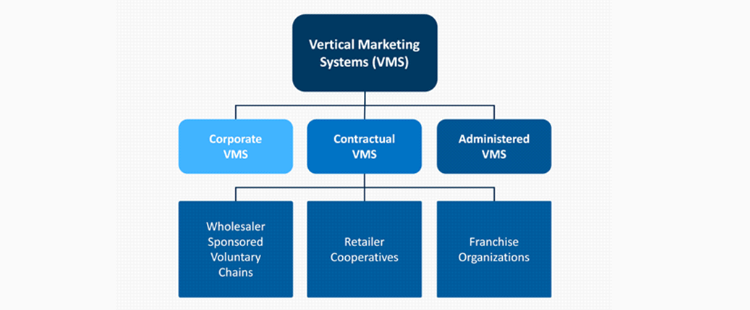When you just start to create your business and brand, your digital marketing strategy should be informed by who your target audience is. Selecting your target audience — the people who will buy from you and eventually become brand advocates — involves numerous factors. However, you must first determine whether a vertical marketing approach is appropriate for your business. After all, it’s usually the greatest solution when you want to focus on a very specific market.
Horizontal or vertical marketing systems are commonly used by businesses to efficiently create and sell their items to their customers. Producers, wholesalers, and retailers collaborate in a vertical marketing system to increase revenues and streamline operations. We clarify what a vertical marketing system is, the three basic varieties, the benefits and potential pitfalls of employing one, and how to choose the ideal type for your organization in this post.
What is a Vertical Marketing System?

Source: https://contensis.uwaterloo.ca/
A vertical Marketing System is one in which manufacturers, wholesalers, and retailers collaborate to meet the demands of their clients. It allows a single business to have complete control over the manufacturing and distribution of a product.
Producers, wholesalers, and retailers often function as independent entities in traditional marketing systems—or horizontal marketing systems—trying to maximize their own profits. While this may allow each business more independence, it may also lead to increased conflict and competitiveness, resulting in both entities losing money.
What sort of companies use Vertical Marketing?

Now that you have a good understanding of what vertical marketing is, it’s time to learn about the types of businesses that employ it. So, to appeal to their small target groups, enterprises that offer highly specialized products frequently utilize vertical marketing. Companies employ this method to build target demographics for a product that has trouble appealing to a larger audience.
Vertical marketing is the appropriate fit for you if you’re a firm that struggles to advertise products to a larger audience.
The Purpose Of Vertical Marketing System
If you want to go into vertical marketing, you should first understand why it exists. It is, as I previously stated, a technique for identifying your company as a specialty specialist. As a vertical marketer, you position yourself as the ultimate expert in a particular field. You’ll need a highly developed method for generating, promoting, and distributing your products in order to carve out a specialized niche.
As a result, you could say that the goal of vertical marketing is to target a specific audience based on the product you’re selling.
Types of Vertical Marketing Systems:
This vertical marketing system is divided into three parts which are explained in detail as given below:-

Source: https://www.sketchbubble.com/
- The corporate system
When all aspects of the distribution channel are streamlined under the direction of a single company, it is referred to as a corporate system. Because the corporate system excludes the function of a middleman, all transactions are conducted internally. Using a corporate system to its full potential allows a corporation to have complete control over the items it produces and the path it takes.
Apple Inc., for example, creates its own things and manufactures them. These items can be purchased at the company’s own retail locations. They don’t need to rely on anyone to produce or sell their goods.
- The contractual system
In a contractual system, each partner in the distribution chain works independently and coordinates their efforts through a written agreement. They must collaborate to improve efficiency and utilize economies of scale, allowing for more competitive pricing. This is also known as a “value-added partnership,” in which they coordinate their tactics through contracts to avoid channel conflict that may result from individual goals.
A popular type of contractual vertical marketing structure is franchising. A franchise agreement is one in which one party (the franchiser) allows another party (the franchisee) the right to use the franchiser’s trademark or brand name, as well as specified business processes and systems, to create and market a product or service in accordance with certain standards.
- The administered system
There is no formal contractual tie or corporate ownership of the distribution route among participants in a managed vertical marketing system. Instead, the size and strength of a single person have an impact on their operations. Simply said, any strong and powerful member of the production and distribution chain has a disproportionate influence over the activities of other members of the channel.
Walmart, for example, is a good illustration of this type of company. Walmart is large enough and powerful enough to manage such a system. Most small firms lack the power to run such a system, but they may find it vital to work with a producer or distributor who does.
Why Should You Invest in a Vertical Marketing System?

What benefits can a vertical marketing system provide your company? Depending on your business needs, it may or may not be the best option for you, but here are some of the most typical advantages.
- Improved Efficiency
Within a vertical marketing structure, those who produce, wholesale, and retail all work together to achieve a similar goal. Because every company has the same goal in mind, there is a greater drive to design systems that are more efficient in general.
- More Effective Branding
You have a unique opportunity to discover your key message when you can focus your marketing efforts on specific industries and customers, improving the chances of brand awareness. By offering a particular product, you may establish your company as an industry authority. Finally, you’ll be able to demonstrate a deeper grasp of your client’s demands, allowing you to earn their trust and stand out from the crowd.
- Enhanced Communication
Communication and relationships tend to be better overall when all companies work together. Everyone in the supply chain should communicate with one another on a regular basis, providing updates and adhering to the same rules. This can lead to improved outcomes, increased profits, and happier consumers.
- Develop Brand-New Ideas
It’s a lot easier to learn about customer insights from within your market, which gives you the opportunity to create new products and/or services. The brands that use a vertical marketing structure are more often than not the ones who can produce the most unique concepts.
How to choose a vertical marketing system?

Follow these steps when choosing a vertical marketing system:
- Consider your resources
The vertical marketing system you select is determined by your current resources. You may wish to use a corporate vertical marketing strategy for your business if you have the revenue, experience, and personnel to build your own production, wholesale, and retail departments. Consider proposing a contractual collaboration if you see another company has the resources you require. Finally, if you’re big enough to make the rules, you might already be a vertical marketing system that’s been administered.
- Define your goals
Developing your own vertical marketing system necessitates a great deal of planning and resources. Consider what you want to accomplish by merging all components of your marketing strategy. This marketing technique may be appropriate for your brand if you need more resources and want less competition. If your business thrives on a little competition, you might want to hold off from teaming.
- Hire a consultant
Consider hiring a consultant if you’re still unclear about which vertical marketing business strategy is appropriate for your company. A business marketing expert can assist you in determining the size, resources, constraints, and needs of your company so that you can make more informed decisions. Look for someone who has worked in your field and has solid experience in business marketing.
Wrapping Up
A vertical marketing system is a novel approach to traditional marketing. It assures that numerous organizations (typically) may work together to meet consumer needs, increase income, and cut costs. A vertical marketing strategy, when addressed correctly and with a lot of patience and forethought, has the ability to take your business to the next level.






